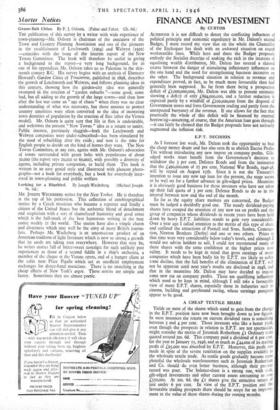FINANCE AND INVESTMENT
By CUSTOS
ALTHOUGH it is not difficult to detect the conflicting influences of political principle and economic expediency in Mr. Dalton's second Budget, I must record my view that on the whole .the Chancellor of the Exchequer has dealt with an awkward situation on sound workmanlike lines. While here and there the Budget- proposals embody the Socialist doctrine of soaking the rich in The interests of equalising wealth distribution, Mr. Dalton has steered a shrewd course between the danger of stimulating inflationary influences on the one hand and the need for strengthening business incentive on the other. The background situation in relation to revenue and expenditure proved, in fact, to be much more favourable than had generally been supposed. So far from there being a prospective deficit of Li,000,000,000, Mr. Dalton was able to present estimates showing a deficit of only L694,000,000, and a further reduction is expected partly by a windfall of £200,000,000 from the disposal of Government stores and from Government trading and partly from the unexpected buoyancy of the revenue. If one allows for the fact that practically the whole of this deficit will be financed by external borrowing—assuming, of course, that the American loan goes through —it can fairly be claimed that the Budget proposals have not seriously augmented the inflation risk.
E.P.T. DECISION As I forecast last week, Mr. Dalton took the opportunity to beat the cheap money drum and has also seen fit to abolish Excesi Profits Tax without introducing any new impost on company profits. Gilt- edged stocks must benefit from the Government's decision to withdraw the 3 per cent. Defence Bonds and from the intimation that the £490,000,000 of 2+ per cent. National War Bonds, 1946-48, will be repaid on August isth. Since it is not the Treasury's intention to issue any new tap loan for the present, the stage seems to be well set for a further advance in gilt-edged prices. Meantime it is obviously good business for those investors who have not taken up their full quota of 3 per cent. Defence Bonds to do so in the interval between now and the end of the month.
So far as the equity share markets are concerned, the Budget must be judged a decidedly good one. The steady dividend-paying shares have escaped the attention of any new tax on profit% and the group of companies whose dividends in recent years have been held down by heavy E.P.T. liabilities stands to gain very considerably. Over a year ago I called attention to the merits of this type of share and outlined the attractions of Purnell and Sons, Sanbra, Cementa- tion, Newton Brothers (Derby) and one or two others. Prices at that time were very considerably below today's levels, and although .1 would not advise holders to sell, I could not recommend many of these shares with the same confidence at the higher prices now ruling. It needs to be kept in mind that gross earnings of many companies which have been badly hit by E.P.T. are likely to suffer some decline, that the full benefits of the elimination of E.P.T. will not be apparent until next year's results are disclosed in 1948, and that in the meantime Mr. Dalton may have decided to impose some -new tax on company profits. These are qualifying influences which need to be kept in mind, although I still take a favourable view of many E.P.T. shares, especially those in industries such as cinema, building and greyhound racing, whose earnings prospects appear to be good.
A CHEAP TEXTILE SHARE
Yields on most of the shares which stand to gain from the change in the E.P.T. position have now been brought down to low figures. In most instances the return on current dividend rates is something between 3 and 4 per cent. Those investors who like a better yield, even though the prospects in relation to E.P.T. are not spectacular, might consider the merits of Jeremiah Rotherham Li Ordinary units quoted around 20S. 6d. This company paid a dividend of 6 per cent. for the year to January 15, 1946, and as much as L44,000 of its trading profit of £95,000 was absorbed by E.P.T. Moreover, this profit was made in spite of the severe restriction on the supplies available to the wholesale textile trade. As textile goods gradually .become more plentiful the wholesale warehousemen such as Jeremiah Rotherham and Co. should -do even better business, although their pre-war record was poor. The balance-sheet is a strong one, with cash, gilt-edged investments and other current assets amounting to over £55o,000. At 20S. 6d. the Cl shares give the attractive return of just under 6 per cent. In view of the E.P.T. position and the favourable trading prospects there should be scope for an improve- ment in the value-of these shares- during the coming months.


























 Previous page
Previous page